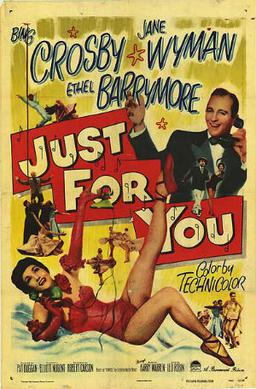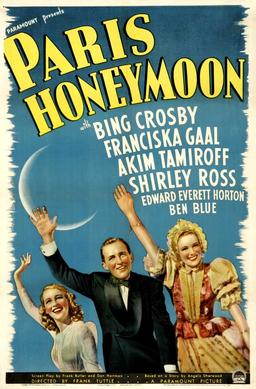Related Research Articles

Jane Wyman was an American actress. She received an Academy Award (1948), four Golden Globe Awards and nominations for two Primetime Emmy Awards.

Harry Warren was an American composer and the first major American songwriter to write primarily for film. He was nominated for the Academy Award for Best Original Song eleven times and won three Oscars for composing "Lullaby of Broadway", "You'll Never Know" and "On the Atchison, Topeka and the Santa Fe". He wrote the music for the first blockbuster film musical, 42nd Street, choreographed by Busby Berkeley, with whom he would collaborate on many musical films.
"Prisoner of Love" is a 1931 popular song, with music by Russ Columbo and Clarence Gaskill and lyrics by Leo Robin.

Here Comes the Groom is a 1951 American musical romantic comedy film produced and directed by Frank Capra and starring Bing Crosby and Jane Wyman. Based on a story by Robert Riskin and Liam O'Brien, the film is about a foreign correspondent who has five days to win back his former fiancée, or he'll lose the orphans he adopted. Filmed from late November 1950 to January 29, 1951, the film was released in the United States by Paramount Pictures on September 20, 1951.

"By The Light of the Silvery Moon" or "By the Light of the Silv'ry Moon" is a popular love song. The music was written by Gus Edwards, and the lyrics by Edward Madden. The song was published in 1909 and first performed on stage by Lillian Lorraine in the Ziegfeld Follies of 1909. It was one of a series of moon-related Tin Pan Alley songs of the era. The song was also used in the short-lived Broadway show Miss Innocence when it was sung by Frances Farr.

"Where the Blue of the Night (Meets the Gold of the Day)" was the theme Bing Crosby selected for his radio show. It was recorded in November 1931 with Bennie Krueger and his Orchestra. The song was featured in a Mack Sennett movie short starring Bing Crosby. Crosby recorded the song on several occasions starting with the November 23, 1931 version with Bennie Kruger and his Orchestra. He next recorded it on July 20, 1940 with The Paradise Island Trio. On July 17, 1945 he recorded it with John Scott Trotter and his Orchestra and his final recording was on April 21, 1954 with Buddy Cole and his Trio for his Musical Autobiography set.

Bing: A Musical Autobiography was Bing Crosby's fourth Decca vinyl LP, recorded and released in 1954.
"How About You?" is a popular song composed by Burton Lane, with lyrics by Ralph Freed. It was introduced in the 1941 film Babes on Broadway by Judy Garland and Mickey Rooney.

"The Gold Diggers' Song " is a song from the 1933 Warner Bros. film Gold Diggers of 1933, sung in the opening sequence by Ginger Rogers and chorus. The entire song is never performed in the 1933 movie, though it introduces the film in the opening scene. Later in the movie, the tune is heard off stage in rehearsal as the director continues a discussion on camera about other matters.

Sing You Sinners is a 1938 American musical comedy film directed by Wesley Ruggles and starring Bing Crosby, Fred MacMurray, Ellen Drew, and Donald O'Connor. Written by Claude Binyon, the film is about three singing brothers who go to California to find their fortune. Initially the film was to be titled "The Unholy Beebes" and then "Harmony for Three" before finishing with "Sing You Sinners". Filming took place in April/May 1938 in Hollywood. Race track scenes were filmed at the Pomona Fairgrounds and at Santa Anita using two dozen of Crosby's horses. Sing You Sinners was premiered on August 5, 1938 at the Del Mar racetrack with the New York premiere taking place on August 16.

"Way Down Yonder in New Orleans" is a popular song with music by John Turner Layton Jr. and lyrics by Henry Creamer. First published in 1922, it was advertised by Creamer and Layton as "A Southern Song, without A Mammy, A Mule, Or A Moon", a dig at some of the Tin Pan Alley clichés of the era.
Rhythm on the Range is a 1936 American Western musical film directed by Norman Taurog and starring Bing Crosby, Frances Farmer, and Bob Burns. Based on a story by Mervin J. Houser, the film is about a cowboy who meets a beautiful young woman while returning from a rodeo in the east, and invites her to stay at his California ranch to experience his simple, honest way of life. Rhythm on the Range was Crosby's only Western film and introduced two western songs, "Empty Saddles" by Billy Hill and "I'm an Old Cowhand " by Johnny Mercer, the latter becoming a national hit song for Crosby. The film played a role in familiarizing its audience with the singing cowboy and Western music on a national level.

"Smilin' Through" is a popular ballad with lyrics and music by Arthur A. Penn.

This is a filmography for the American singer and actor Bing Crosby.

Just for You is a 1952 American musical film starring Bing Crosby and Jane Wyman and the final motion picture to be directed by Elliott Nugent. It was nominated for Best Song at the 1953 Academy Awards. The film was based on the book Famous by Stephen Vincent Benét. Filming took place between October 22 and December 20, 1951. It is said that Judy Garland had originally been sent a script as she was being considered for the female lead, but she apparently decided not to proceed with the project. Location scenes were filmed at Lake Arrowhead, near San Bernardino, California and at Big Bear Lake in the San Bernardino National Forest.

Paris Honeymoon is a 1939 American musical film directed by Frank Tuttle and written by Frank Butler and Don Hartman. The film stars Bing Crosby, Franciska Gaal, Akim Tamiroff, Shirley Ross, Edward Everett Horton and Ben Blue. Filming took place in Hollywood from May 23 to July 1938 and the film was released on January 27, 1939, by Paramount Pictures.

Selections from the Paramount Picture "Just for You" is a Decca Records studio album by Bing Crosby, Jane Wyman and The Andrews Sisters of songs featured in the film Just for You released in 1952. All of the songs were written by Harry Warren (music) and Leo Robin (lyrics).

Road to Bali is a Decca Records studio album by Bing Crosby, Bob Hope and Peggy Lee of songs featured in the film Road to Bali released in 1952. All of the songs were written by Jimmy Van Heusen (music) and Johnny Burke (lyrics). The songs were featured on a 10” vinyl LP numbered DL 5444 and in a 3-disc 45rpm box set numbered 9-375.

Themes and Songs from The Quiet Man is a Decca Records album by Victor Young and Bing Crosby featuring the music used in the Republic Pictures film The Quiet Man. It was issued as a 10” LP with catalog No. DL5411 and as a 4-disc 45rpm set (9–342).
References
- ↑ Just for You - Soundtracks at Internet Movie Database
- ↑ "Internet Movie Database". Internet Movie Database. Retrieved December 1, 2015.
- ↑ "A Crosby Discography". BING magazine. International Club Crosby. Retrieved January 18, 2017.
- ↑ Whitburn, Joel (1986). Pop Memories 1890–1954 . Wisconsin, USA: Record Research Inc. p. 112. ISBN 0-89820-083-0.
- ↑ "Billboard". Billboard. July 19, 1952.
- ↑ Macfarlane, Malcolm. "Bing Crosby - By By Day". BING magazine. International Club Crosby. Retrieved January 18, 2017.
- 1 2 "Bing Crosby music featured in movies, TV shows and video games". tunefind.com. Retrieved 31 December 2022.
- ↑ "The Online Discographical Project". 78discography.com. Retrieved July 5, 2017.
- ↑ "Final Score Soundtrack (2018) OST". ringostrack.com. Retrieved 31 December 2022.